Have you shied away from non toxic dishwasher detergents, because you believe that chemicals are required to get sparkling, spot-free dishes? It’s time to bust through that myth because dishwasher detergents that contain natural and organic ingredients not only are tough on grease, but they are also safer for humans and the environment.
*Suzi(Gurl Gone Green) is a participant in the Amazon Services LLC Associates Program, an affiliate advertising program designed to provide a means for sites to earn advertising fees by advertising and linking to amazon.com.
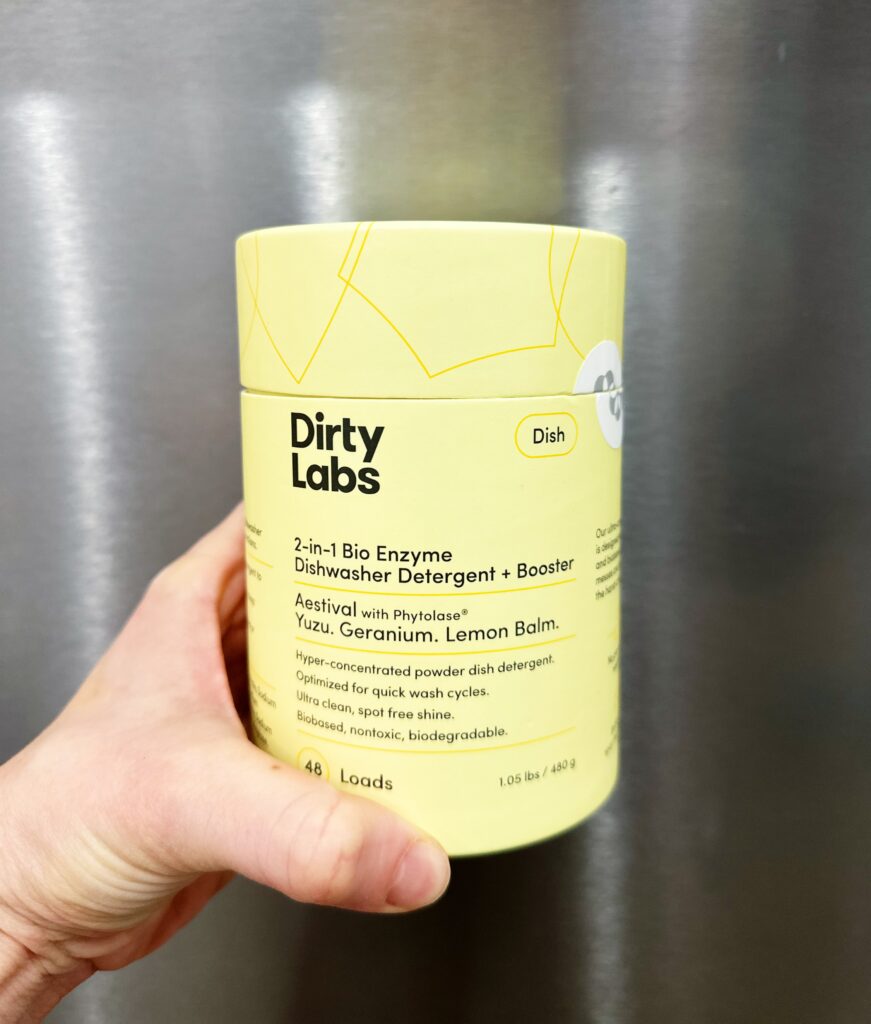
Dirty Labs Dishwasher Detergent + Booster
Dirty Labs is the best non toxic dishwasher detergent in my opinion for a couple reasons. First, the ingredients are clean but it actually cleans your dishes- they come out sparkling and streak free! Even food that was stuck on- it doesn’t mess around. The second reason is they really take sustainability to the next level with their packaging. The container is made out of recycled cardboard and there are no plastic pouches involved. They really have thought of everything.
Why Choose Non Toxic Dishwashing Detergents
There are a couple reasons why it is probably worth at least considering a non toxic dishwasher detergent. This includes:
1. Health Impacts
Using natural and organic ingredients in our cleaning products reduces the risk of allergic reactions, skin irritations, and accidentally ingesting chemicals with our next meal from the chemical residue left on our dishware. When you use a non-toxic dishwashing detergent, you also avoid the onslaught of chemicals that’s in the steam when you open your dishwasher.
2. Environmental Impacts
Wastewater treatment plants are not able to prevent all chemicals from getting into bodies of water such as lakes, streams, ponds, and rivers.
Many traditional detergents contain phosphates which may seem like benign compounds, but they can be the catalyst for an ecological disaster. Okay, disaster is a strong word, but their bioaccumulation in the waterways causes algae blooms. The proliferation of algae results in less oxygen in the water and consequently harms marine wildlife.
It’s not just phosphates that can be problematic, it’s all of the chemicals such as dyes and artificial fragrances that can affect the marine ecosystem. Some of the unintended consequences to marine life are shorter life spans and reduced fertility.
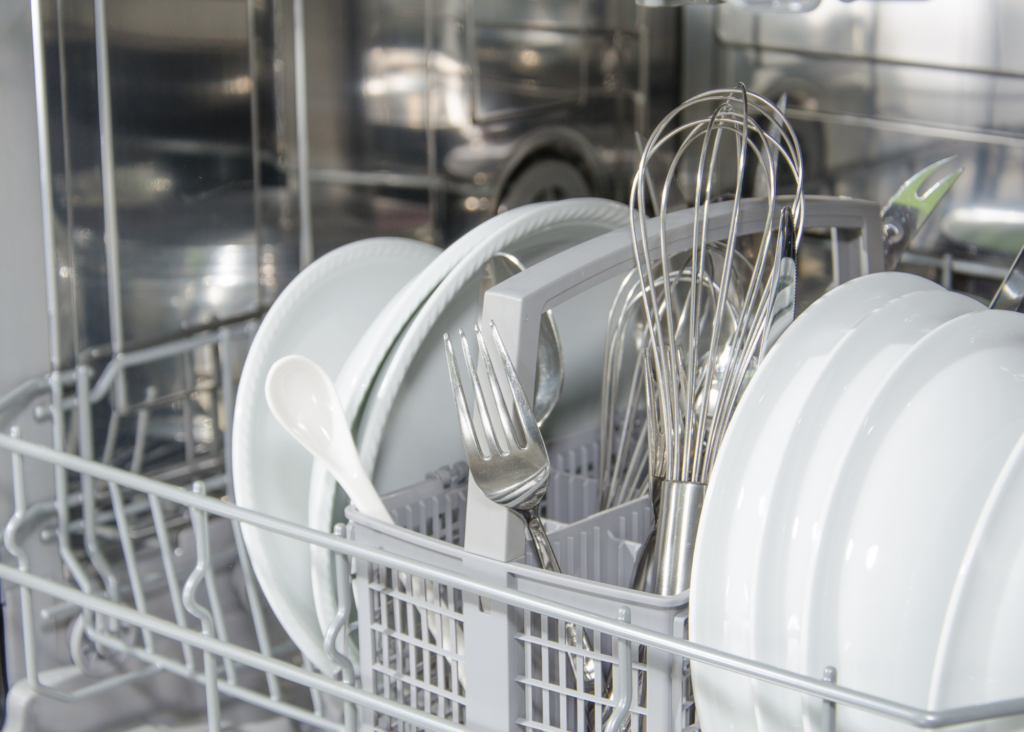
Ingredients in Dish Detergents
As always, when looking for non toxic products for our homes, there are usually some common ones you see over and over in certain products. Here are some ingredients you may want to avoid when looking for you next dishwasher detergent:
Phosphates – Chemicals that can pollute waterways and cause algae to grow out of control and negatively impact other aquatic life. (source)
Artificial Fragrance – A cocktail of chemicals that can cause allergic reactions, rashes, and are harmful to the environment. (source)
Dyes – These chemicals can trigger rashes and allergies and most are proven endocrine disruptors and carcinogens. (source)
Polyacrylates – Exposures to acrylates have been related to eye, throat and skin reactions as well as more serious health consequences such as reproductive toxicity, cancer, neurological damage, development issues, organ system toxicity, cellular damage.(source)
Sodium Hypochlorite – This is another name for bleach. It can cause gastric burns and it can be damaging to eyes and skin and cause major throat irritation. (source)
Benzisothiazolinone – A chemical that causes eye, lung, and skin irritation, and it’s harmful to fish. (source)
Methylsothiazolinone – Associated with allergic reaction and inhalation toxicity. (source)
Ethoxylated surfactants – Ingredients such as PPG, PEGs, Polysorbates, and Sodium laureth sulfate are ingredients that may leave behind trace amounts of carcinogens 1,4 dioxane and ethylene oxide which are linked to cancers and development issues not to mention harmful to the environment. (source)
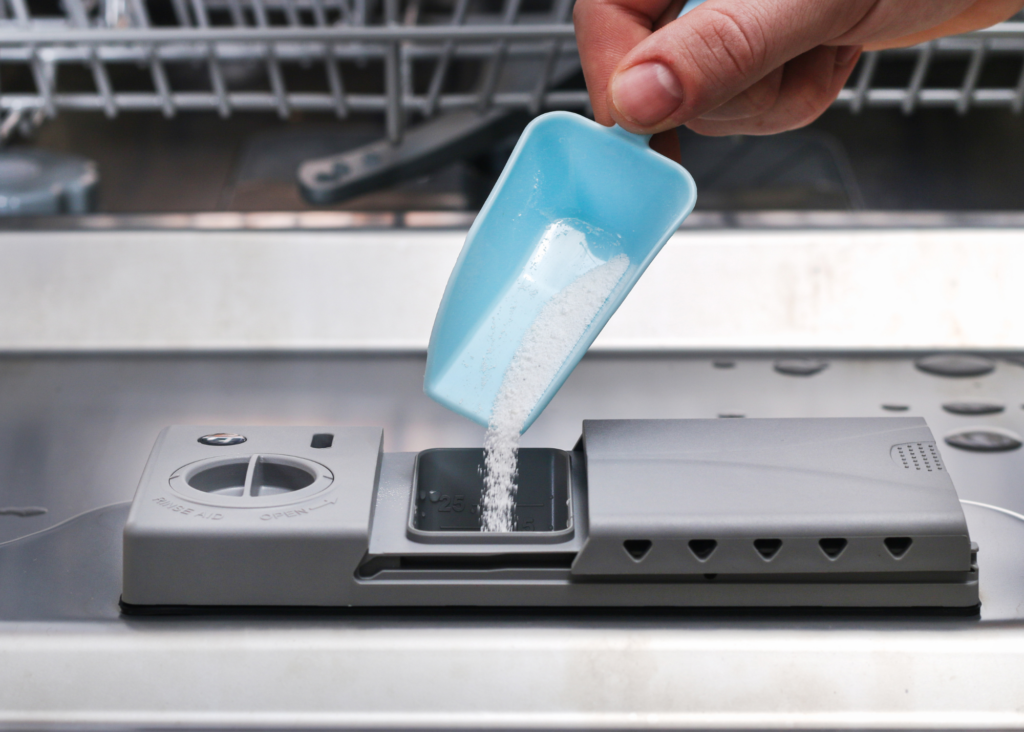
Unfortunately when you see a list of everything you shouldn’t be using, it lends the question of what should you look for in an effective dishwasher detergent that is free of toxins. Here are some ingredients that would be beneficial:
- Citric acid – plant-based pH adjuster
- Sodium bicarbonate (aka baking soda) – a mineral-based scouring agent and deodorizer.
- Sodium citrate – plant based water softener
- Sodium silicate – mineral corrosion inhibitor
- Sodium carbonate – mineral based cleanser and water softener
- Sodium percarbonate – mineral based cleanser, stain remover
- Sodium sulfate – mineral processing aid
- Amylase – enzyme that cuts through starch molecules
- Protease – enzyme that breaks proteins down
- Alkyl polyglucoside – plant-based cleanser
- Decyl glucoside – plant-based foaming cleanser
- Sodium Polyaspartate – plant-based anti-redeposition agent
- Sodium carboxymethyl inulin – anti-redisposition agent that suppresses filming and spotting
Best Non Toxic Dishwasher Detergents
Nature Clean Automatic Dishwasher Packs & Rinse Aid
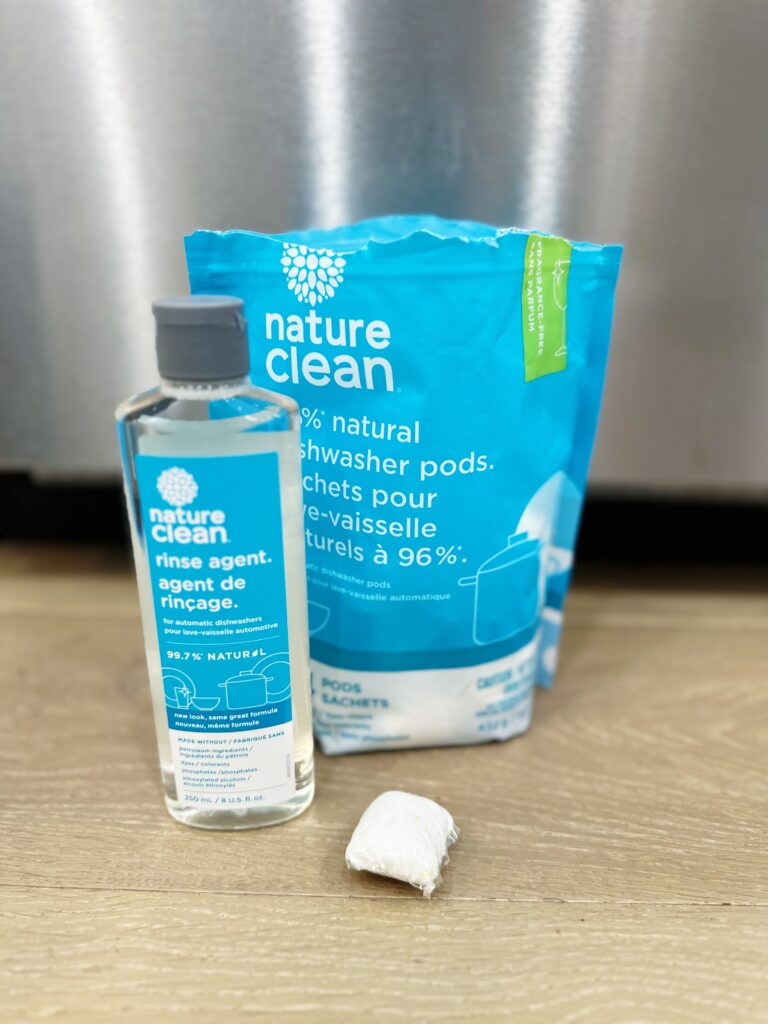
These high performing pods do not use chlorine, phosphates, perfumes, dyes or animal by-products. They are also 100% biodegradable. This rinse aid removes spots and film from dishes without any phosphates, EDTA, NTA, alcohol ethoxylates, dyes and fragrances.
Ingredients
Dishwasher Pods: Sodium Carbonate, Sodium Citrate, Citric Acid, Aqua/Water/Eau, Sodium Carbonate Peroxide, Sodium Silicate, Zeolite, Sodium Polyaspartate, Sodium Sulfate, Sodium Metasilicate, Linear Alcohol Ethoxylate, Enzyme Blend, Poly Vinyl Alcohol (water-soluble film)
Rinse Aid: Decyl Glucoside, Citric Acid, Tetrasodium Iminodisuccinate
Price Range
$5-$30
Where to Buy
Nature Clean products can be found on Amazon and at many Canadian retailers including, Grocery Gateway, Loblaws, Spud.ca, Amazon.ca, Terra 20, Well.ca. Their online store is under renovation at the time of this post.
Review
The Nature Clean Dishwasher Packs worked very well. My dishes were clean and there was no residue left on them. Even in the light my glass dishware had no streaks or marks. I also love that this comes in an unscented version too. There are minimal ingredients overall as well. They also use Poly Vinyl Alcohol for their packaging of their packs which is great because it’s biodegradable. So no microplastics or harmful residues left behind. It is pricier compared to other packs I reviewed. The price per pack is around $.47.
They do have an ethoxylated ingredient in them, which would make me not want to buy them again. Ethoxylated ingredients can contain 1,4 dioxane which is a known carcinogen. I think the amount is small and it’s different in a dishwasher pod versus skincare, however, I still like to see ingredients without them if possible. Also, they’re pretty pricey overall too.
This is a great rinse aid! I had never used one until trying Nature Clean Rinse Aid and I have to say I’m impressed. It left my dishes sparkling and shiny. No residue or film on the dishes at all. You could even use this with other dishwashing detergents if you felt like you needed an extra boost to your detergent.
Clean People All Natural Dishwasher Pods
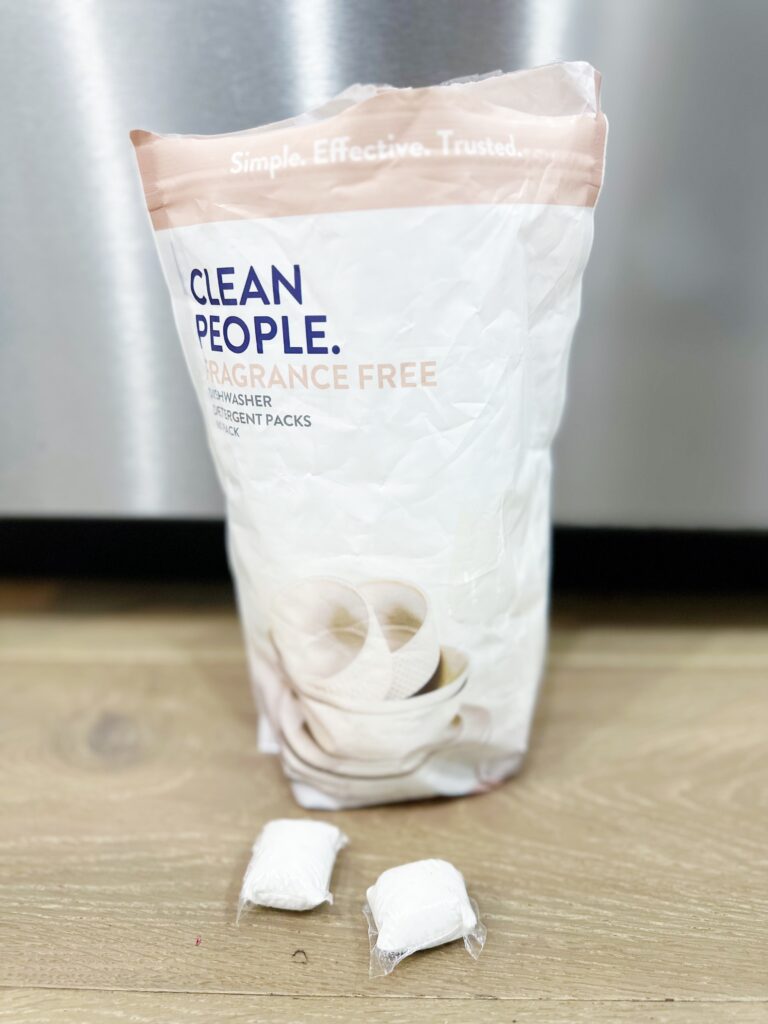
These pods live up to their tag line – clean ingredients for clean people. They contain no phosphates, dyes, parabens, phthalates, chlorine, and are vegan, cruelty free, and are made in America.
Ingredients
Sodium Carbonate, Sodium Sulfate, Sodium Metasilicate, Alkyl Polyglucoside, Sodium, Citrate Dihydrate, Sodium Percarbonate, Tetraacetylethylenediamine (TAED), Itaconic Acid, Sodium Salt
Price Range
$10-$49
Where to Buy
You can purchase Clean People products from their website or from Amazon.
Review
These work great at getting dishes sparkling clean and without any residue. I also appreciate the minimal ingredients. The price is better too. Coming in at .31 per pack. I did find it annoying that the packs were stuck together. It caused some to tear and spill the detergent. They need to figure that out. I tried the fragrance free version and the lemon fresh scent. The lemon fresh scent wasn’t overpowering, but I still prefer unscented.
They don’t have any ethoxylates in the detergent packs, which can be hard to find in cleaning products. However, they do have the ingredient Tetraacetylethylenediamine (TAED), which is a bleaching activator. The concentration in cleaning products is very small and the overall risk once I looked into it minimal if any at all(source). The one thing I didn’t love was how they didn’t list their ingredients visibly on their packaging. You have to go to their website to see their ingredients.
Dirty Labs Dishwasher Detergent and Booster

This 2-in-1 powder formula is designed to effectively clean dishes powered by the most advanced bioenzymes and natural, nontoxic ingredients, including no 1,4-dioxane or CA Prop 65 chemicals.
Ingredients
Sodium citrate, Sodium carbonate, Sodium carbonate peroxide, Sodium gluconate, Protease, Sorbitan caprylate, Hydrous sodium silicate powder, Sodium carboxymethyl inulin, Alpha-amylase
Price Range
$16.20-$18.00
Where to Buy
You can purchase Dirty Labs from their website, Amazon, and select Whole Foods stores.
Review
This detergent is so good! My dishes were sparkling and always clean. I noticed they seemed drier too? Not sure how that works, but they were every time I used the detergent. There were no spots and even stuck on food it was removed. I only used 1 scoop per load. However, they said you can use 2 scoops for heavily soiled loads but I never needed to and it worked great. The wood scooper they include with the detergent measures 1 Tablespoon.
They are next level in everything they do, from how they manufacture their product to the actual product sourcing itself. Pretty amazing! Their packaging is made out of recycled cardboard. You can tell to- their product speaks for itself once you use it. It is good for 48 loads, which comes out at .41 per load which is on the pricier side. However, I will say it works incredibly well and no detail is spared in their process.
Puracy Dishwasher Pods
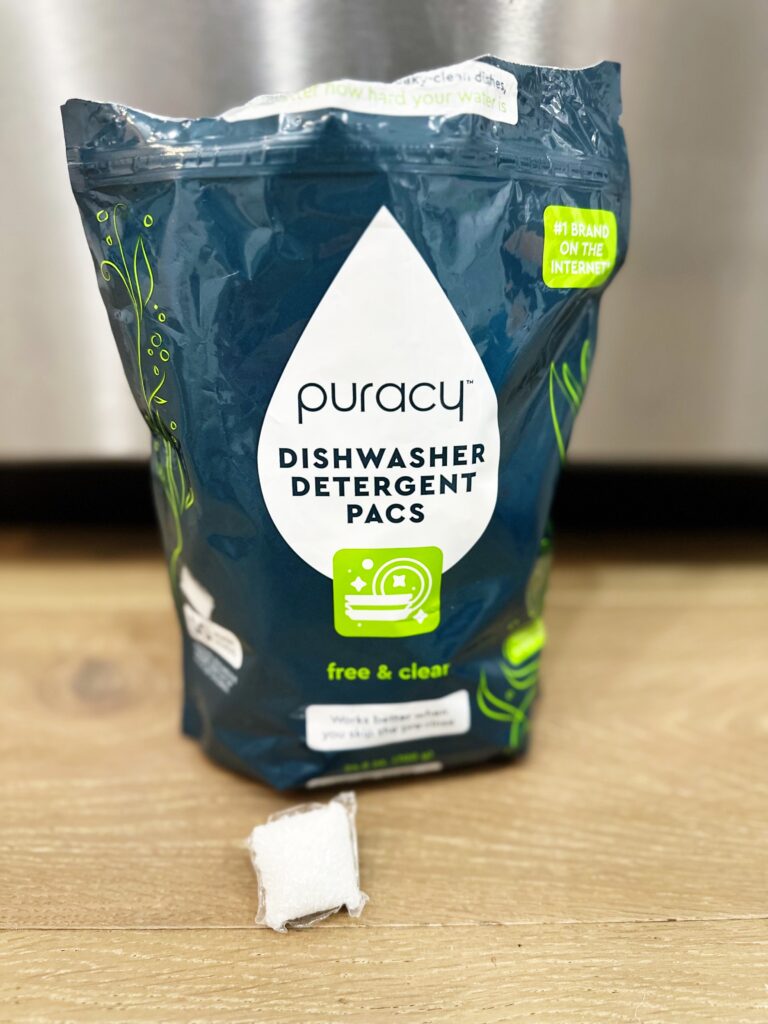
These plant and mineral-derived pods were developed by a chemist and real-world tested and met with unanimous approval for their grease-cutting and spot-free dishes.
Ingredients
Sodium citrate, Sodium carbonate, Sodium percarbonate, Alkyl polyglucoside, Sodium metasilicate, Protease, Carboxymethyl inulin, Amylase
Price Range
$8.49-$9.99
Where to Buy
You can purchase Puracy products through their website, Amazon, and Target.
Review
These pods clean dishes so well! They are very powerful and don’t leave behind any residue. I was actually surprised by the ingredients too. Super minimal ingredients and clean. I also appreciate that they use Poly Vinyl Alcohol for their packaging of their pods. As I mentioned this is biodegradable and doesn’t leave behind microplastics. I also love how easy these are to find too! Makes it such a great option for people. They are a little pricier than some coming in at $.41 per pod. Overall, these really performed so well!
Aspen Clean Dishwasher Pods
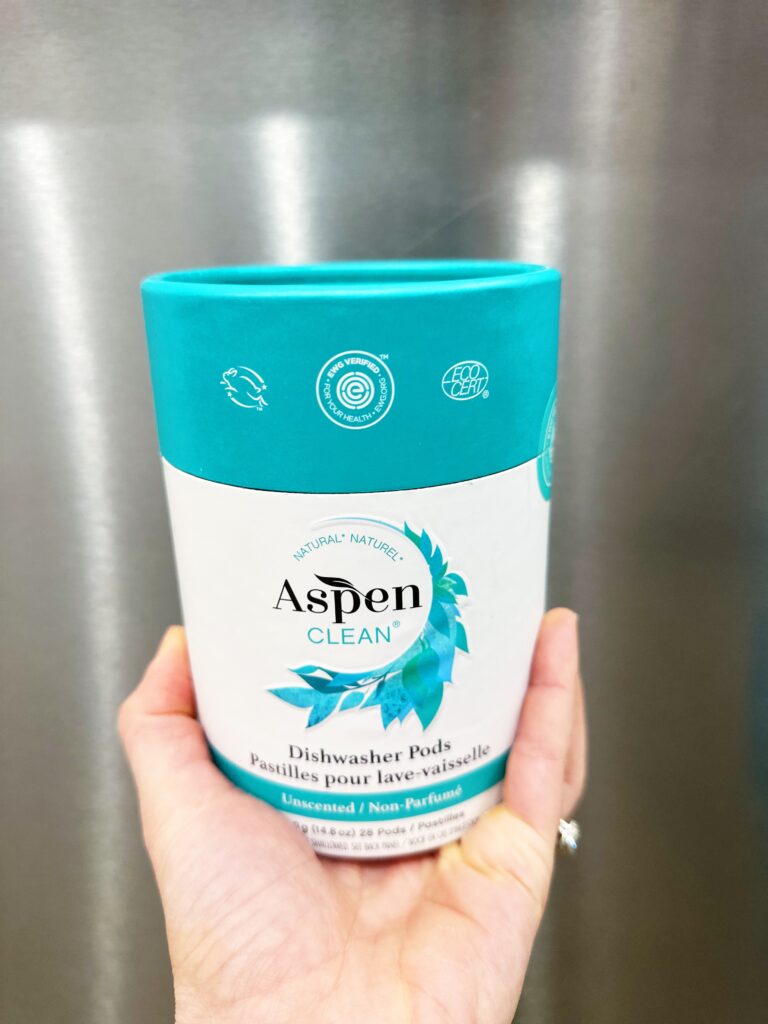
Voted as the best eco-friendly dishwasher pods by Good Housekeeping and EWG Verified™ to be free from dyes, chlorine, SLS, and phosphates.
Ingredients
Sodium Citrate, Sodium Carbonate, Sodium Carbonate Peroxide, Sodium Sulfate, Sodium Silicate, Decyl Glucoside, Subtilisin, Alpha-amylase, Sodium Carboxymethyl Inulin
Price Range
$16.19-$17.99
Where to Buy
You can purchase Aspen products from their website, Amazon or from select stores in Canada.
Review
I was excited to try these dishwashing pods specifically because of their high praise from publications. I must say they lived up to the hype. My dishes were clean and left with no residue. No weird smell and I love that they really take everything to the next level by even housing their pods in a paper container that is compostable. No plastic at all! The actual pods are wrapped in Poly Vinyl Alcohol which I mentioned earlier is biodegradable and leaves no microplastics behind or harmful residue. They are very pricey though! Coming in at $.71 per pod. They are also harder to find, other than Amazon, and their website you aren’t going to find them in stores, unless you live in Canada.
Better Life Dishwasher Detergent Gel
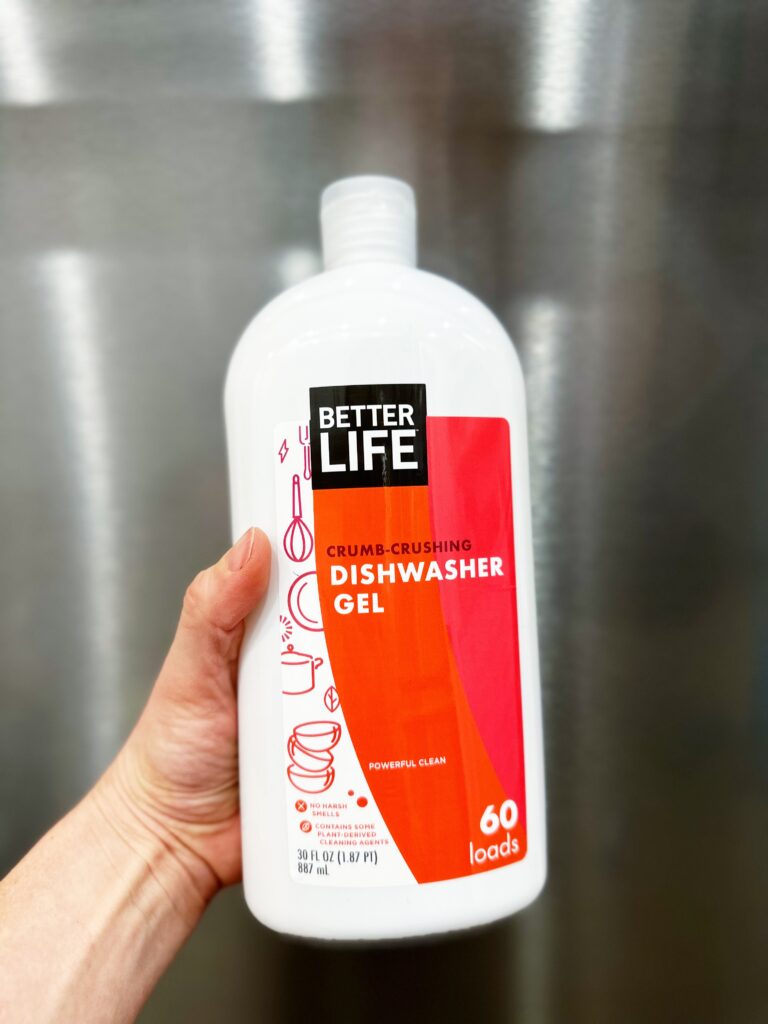
This ultra-concentrated dishwasher soap can get rid of stubborn stains and stuck-on food for unbelievably clean dishes that sparkle and shine without petroleum solvents, chlorine or bleach, added alcohols, added parabens, SLS or SLES.
Ingredients
Water, Ethoxylated Alcohol, Sodium Citrate, Sodium Silicate, Citric Acid, Sodium Polyacrylate, Propanediol, Xanthan Gum, Protease, Amylase, Titanium Dioxide, Methylisothiazolinone, Benzisothiazolinone
Price Range
$7.09-$13.80
Where to Buy
You can purchase Better Life products from their website, Amazon, Thrive Market, Walmart, Safeway, and a variety of grocery stores.
Review
I do love that this dishwasher detergent is widely available at so many locations- makes it so nice when you’re shopping and wanting something clean or are in a pinch. I wish the actual container wasn’t plastic, as that’s so much waste every time you use a bottle. The formula was ok. Not my favorite that I tried. While it did clean my dishes and didn’t have any residue I noticed it wouldn’t get certain stuck on food pieces off dishes. It didn’t seem as powerful as some of the other dishwasher detergents I had used.
I also find it harder to know how much to use compared to pods. Some places I read that people would use too much and have an excess amount of bubbles, while others said they needed at least 4 TBLS. I used at least 2 TBLS. per load. It is a little cheaper than other dishwasher detergents coming in at $.23 per ounce. But it could add up if you’re having to use 4 TBLS. per load.
I also wouldn’t buy this again because of some of the ingredients listed. Specifically, Benzisothiazolinone, and Methylisothiazolinone. These can be high allergens and irritants and Methylisothiazolinone has been shown to be a neurotoxin. Also, there is ethoxylated alcohol in it as well. It may be on the cheaper side, I will still choose other non toxic detergents before this one.
Blueland Dishwasher Detergent Tablet
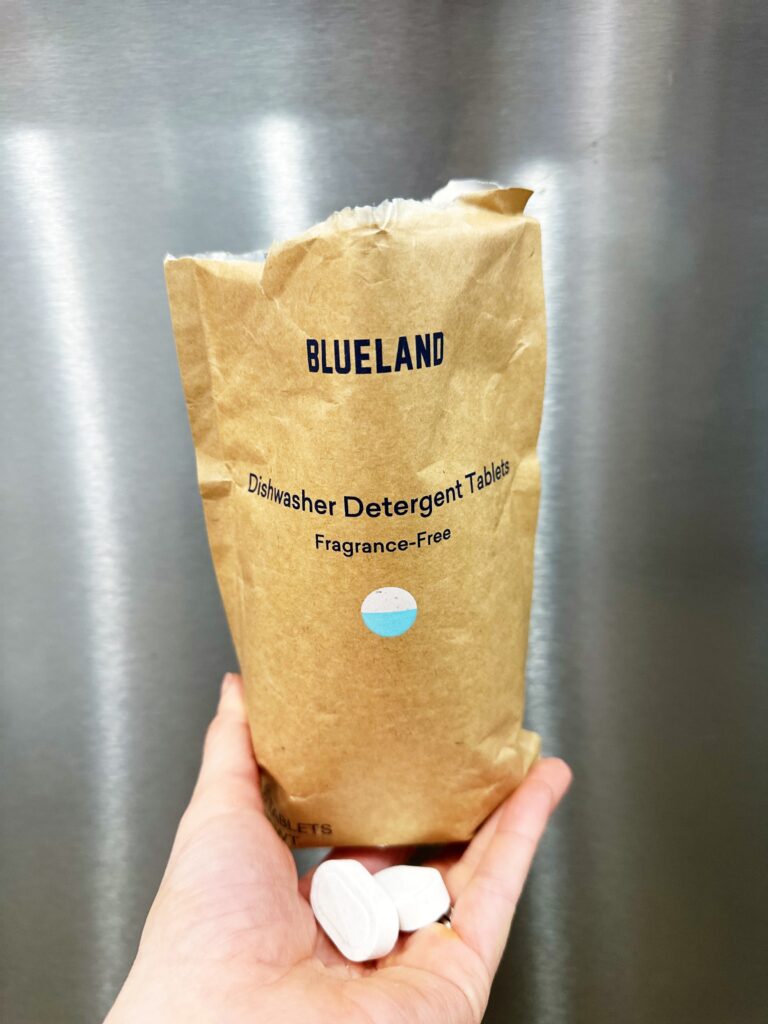
These tablets are tough on stains, yet safe enough for baby bottles with plant and mineral-based ingredients certified by EPA Safer Choice, EWG, and Cradle to Cradle.
Ingredients
Sodium Carbonate, Citric Acid, Sorbitan Caprylate, Subtilisin, Amylase, Sodium Carboxymethyl Inulin, Lauryl/Myristyl Glucoside, Sodium Citrate
Price Range
$20-$25
Where to Buy
You can purchase Blueland products through their website or from Target, Fred Meyer, Costco, Amazon, and other retailers.
Review
Again, two thumbs up for the availability of these dishwasher detergent tabs! I love that you can find them at common retailers. I love that these are tabs and not wrapped in anything- no plastic! They work well. My dishes were shiny and streak free. No weird scent at all. They’re not super spendy, but not the cheapest coming in at $.39 a tab. Even the package they come in is made out of paper and is compostable. A great product all around. I did read some reviews saying the dishwasher tabs left a grainy residue on dishes but I did not experience this. I’m sure it can vary depending on what type of dishwasher you have and how powerful it is.
Related Content: Blueland Review (Non Toxic Cleaning Products)
Planet Automatic Free & Clear Dishwasher Detergent
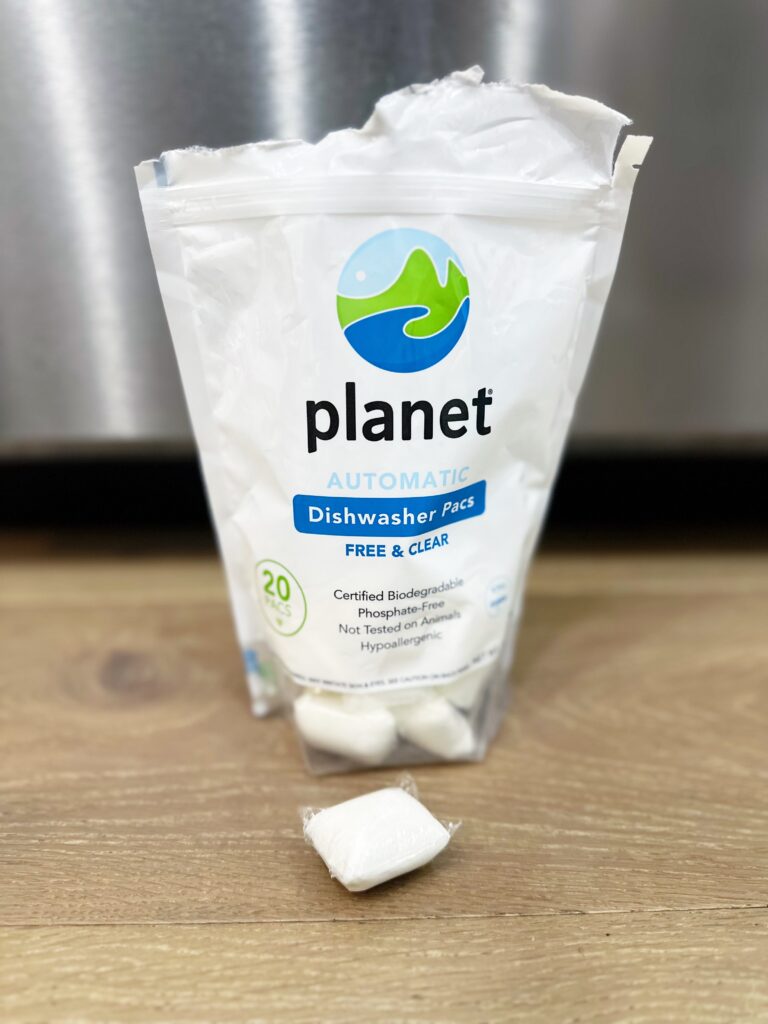
This detergent uses ingredients from plant-based sources that results in a highly effective biodegradable formula that is free of phosphates, chlorine, dye and fragrances.
Ingredients
Sodium Citrate, Sodium Carbonate, Sodium Percarbonate, Sodium Sulfate, Sodium Polyaspartate, Sodium Silicate, C12-14 Pareth-11, Citric Acid, Protease, Amylase
Price Range
$6-$82
Where to Buy
You can purchase Planet Automatic products from Amazon, Safeway, Walmart, Azure Standard, and other retailers.
Review
These worked very well at cleaning the dishes and not leaving any residue or film. While you might think they are cheaper initially, they actually still run $.31 per pod. You just don’t get as many pods in each pouch. The pod is biodegradable and dissolves. The ingredient I didn’t like seeing in these pods was C12-14 Pareth-11. This is an ingredient that is ethoxylated and therefore likely contains 1,4 dioxane which is a known carcinogen. While I was pleased with the performance I wouldn’t use these again.
Grab Green Dishwasher Pods
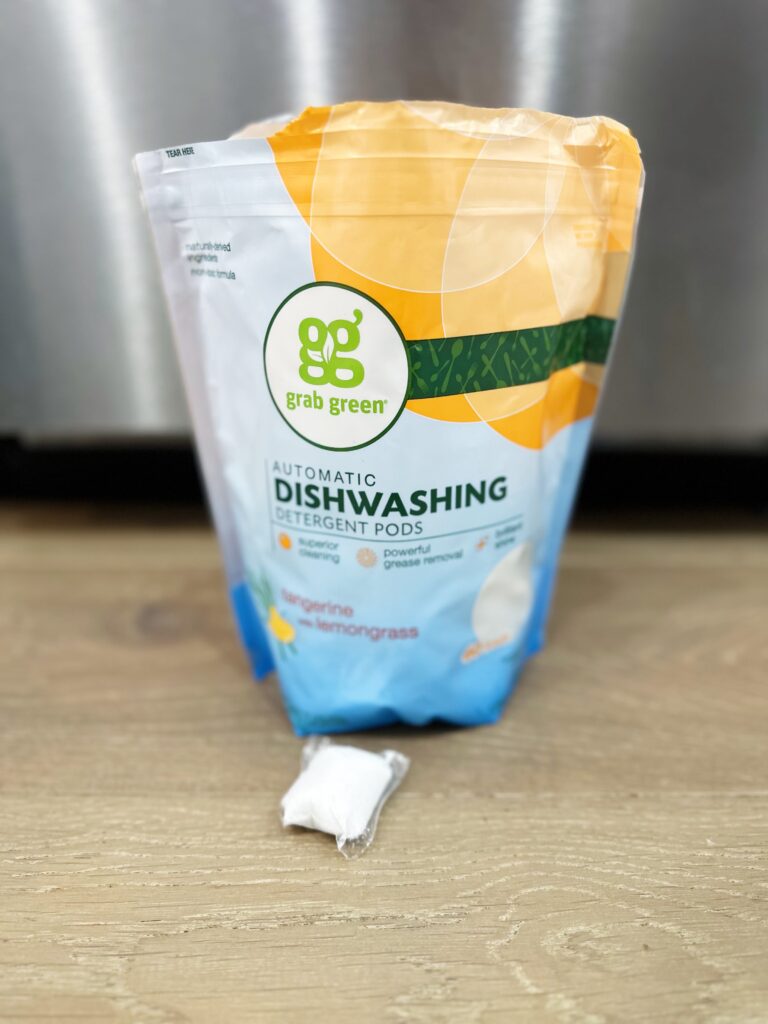
Powerful pre-measured powder pods cut through grease and grime without the use of harsh chemicals. The pods do not look like candy and the bitter outer layer will prevent anyone from taking a bite.
Key Ingredients
Sodium citrate, sodium carbonate peroxide, sodium sulfate, sodium carbonate, sodium silicate, linear alcohol ethoxylate, tetrasodium iminodisuccinate, hydrated silica, sodium polyaspartate, amylase enzyme blend, subtilisin enzyme blend, polyvinyl alcohol
Price Range
$10-$48
Where to Buy
Grab Green products are available through their website and they are in over 6,000 conventional and natural retailers across the USA, and in several countries across the globe.
Review
I have used these on and off for years. They were one of the first dishwashing pods I found that were cleaner. I prefer their fragrance free pods but they do have scented ones that are scented with essential oils only. The pods work great at cleaning dishes and leaving them shiny and streak free. I really appreciate their ingredient transparency for a brand. You can easily find all their ingredients on their website and they even share why they use them in their products. The one thing I don’t like about these pods is the ingredient linear alcohol ethoxylate. This is an ethoxylated ingredient which means it can be contaminated with 1,4 dioxane which is a known carcinogen. The packs are made with polyvinyl alcohol- which is biodegradable. They are $.32 per pod.
Ecover Automatic Dishwashing Tablets
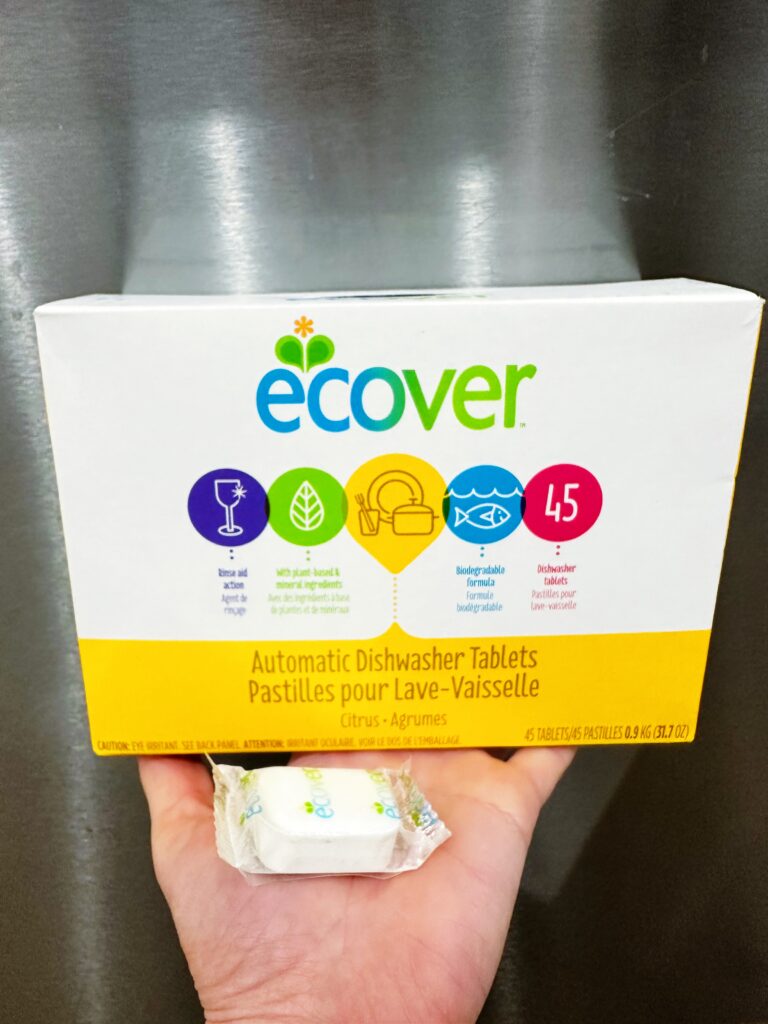
These tablets are made with plant-based and mineral ingredients and effectively clean dishes without phosphates. They are also biodegradable.
Key Ingredients
Sodium Citrate, Sodium Carbonate Peroxide, Sodium Carbonate, Disodium Disilicate, Sodium Bicarbonate, Sodium Poly Asparaginate, Tetra Acetyl Ethylene Diamine (TAED), Iso-octyl Glucoside, D-glucitol, Hydrogenated Rapeseed Oil, Parfum, Glycerin, Amylase, Subtilisin, Limonene, Sodium Gluconate
Price Range
$9-$85
Where to Buy
Amazon and other leading retailers.
Review
These are not my favorite dishwashing tabs and ones I wouldn’t recommend for several reasons. One, they didn’t work as well at cleaning my dishes. There was even some of the tab/pod still left in my dishwasher at times. The scent I didn’t like in general and if I can avoid fragrance I will -and these have fragrance in them. Plus, there is no need for fragrance on my dishes. I also don’t like seeing hydrogenated rapeseed oil in the formula. Rapeseed oil is a common oil that is typically a GMO and the process of creating it uses chemical solvents and is not safe at all. This was not a winner for me.
Beyond Auto Dish Tabs
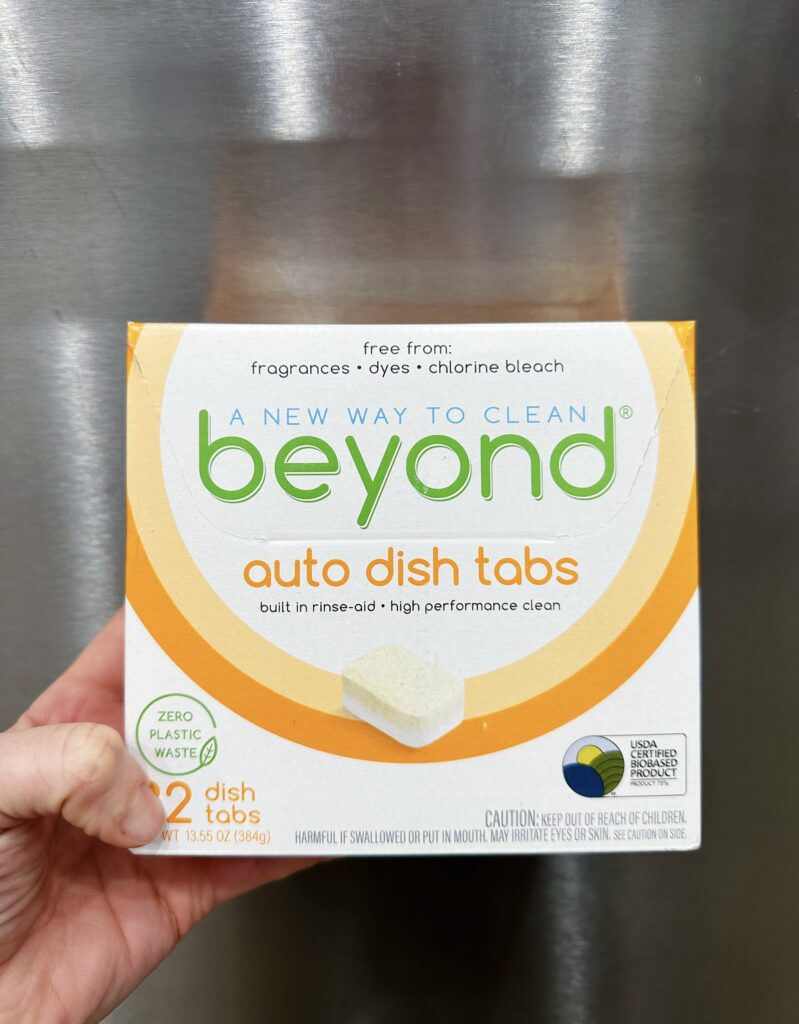
The Beyond Tabs are formulated with high-performance plant-derived and mineral-based ingredient technology. These tabs have a built-in rinse-aid that are designed to clean in short dishwasher cycles.
Key Ingredients
Sodium Carbonate, Sodium Citrate, Sodium Carbonate Peroxide, Citric Acid, Sodium Bicarbonate, Sodium Silicate, Water, Alcohols, C16-18 Ethoxylated, Acrylic acid, TAED, Glycerin, Subtilisin1, Plant Extract, Trideceth-4, Amylase1, Bentonite, Polyvinyl Alcohol
Price Range
$12-$63
Where to Buy
You can purchase Beyond Auto Dish Tabs through their website and other retailers such as Walmart, Sedink’s, Woodman’s Markets, Outpost Natural Foods and Amazon.
Review
These were one of the first natural dishwasher pods I tried. They work great at cleaning my dishes and not leaving a residue. The wrapper they come in is completely biodegradable. You don’t need to remove the wrapper before you put it in the dishwasher. I also liked these because there is no fragrance at all when you use them. Sometimes even fragrance free ones can have a scent of some kind still, these just have nothing. They are $.32 per tab. Not too crazy, but not the cheapest. I also like that they come in a box- so plastic free as well. The one thing I don’t like about these pods is the ingredient C16-18 Ethoxylated. This is an ethoxylated ingredient which means it can be contaminated with 1,4 dioxane which is a known carcinogen.
Dishwashing Detergent FAQ’s
1. Why are phosphates bad in dish detergents?
Phosphates can be harmful to the environment because the chemical compounds can pollute waterways and cause an overgrowth of algae which can harm fish and other aquatic life. Unfortunately, waste water treatment plants aren’t able to prevent all phosphates from escaping into rivers and lakes.
2. Can natural dish detergents actually clean tough grease?
Yes, natural dish detergents can cut through grease through mineral and plant-based ingredients.
3. Is there a non toxic dishwasher detergent available at Target?
Yes, you can find Blueland dishwasher detergent tablets and Puracy dishwasher pods at Target.
4. Does having hard water change the effectiveness of a natural dishwashing detergent?
Hard water can compromise the effectiveness of some, but not all natural dishwashing detergents.
To combat hard water, it’s important to look for a natural dishwashing detergent that contains a sodium-based chemical as the main ingredient. Sodium creates a reaction that reduces residue on dishes effectively turning hard water into soft water.
Through research and customer reviews, Discover magazine listed Ecover Automatic Dishwashing Tablets and Blueland Dishwasher Detergent Tablets as 2 of the 10 best dishwasher detergents for hard water in 2023.
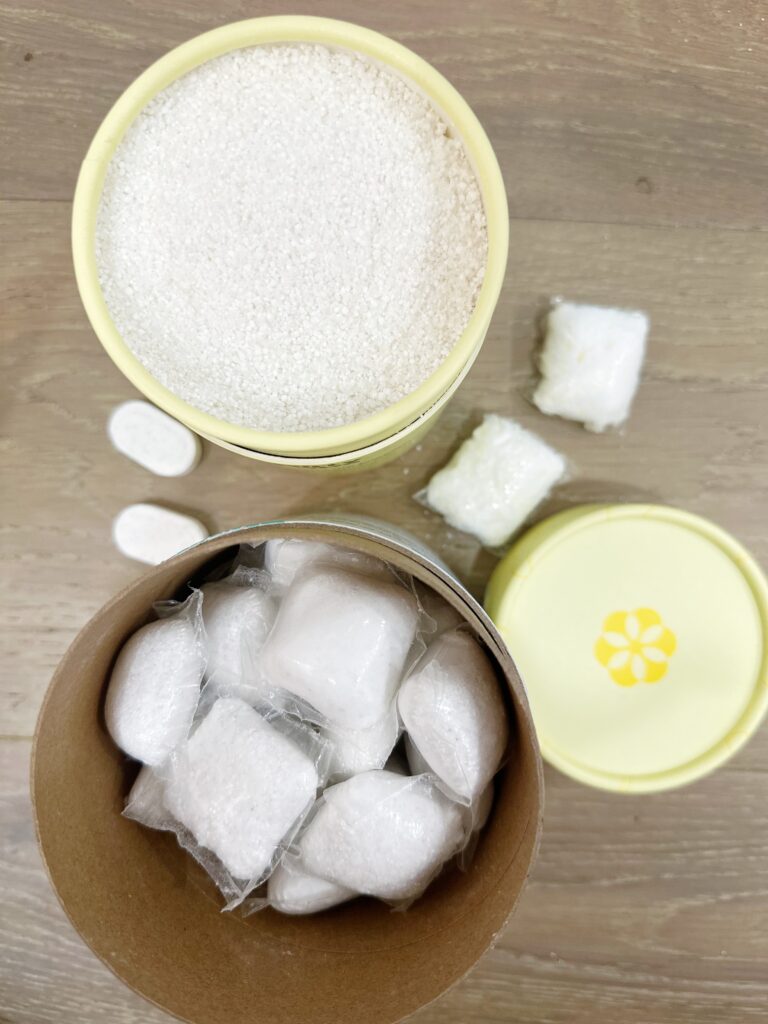
Conclusion: Do Natural Dish Detergents Perform As Well As Conventional?
Yes, natural dish detergents can perform just as well as conventional detergents. The key will be to find a detergent that is formulated to meet your needs. Hopefully through this post you’ll discover the detergent that is right for you.
What’s your favorite natural and non toxic dishwasher detergent? Share below!
If you liked this post, check out these past posts:
- Best Non Toxic Dish Soaps
- Best Natural and Non Toxic Laundry Detergents
- Branch Basics (Tested + Reviewed)
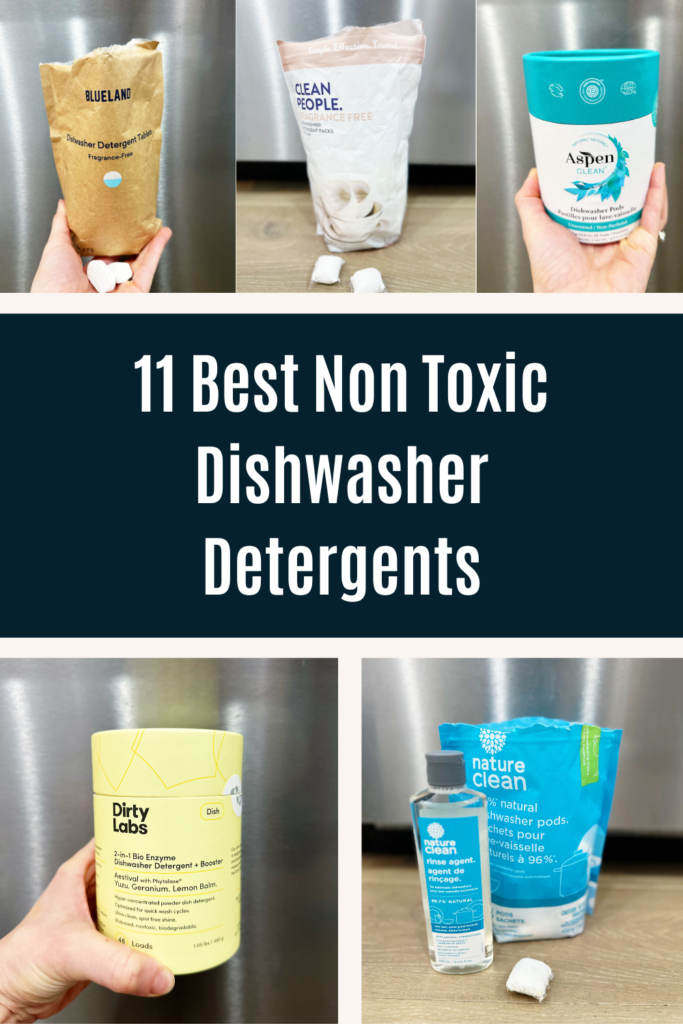

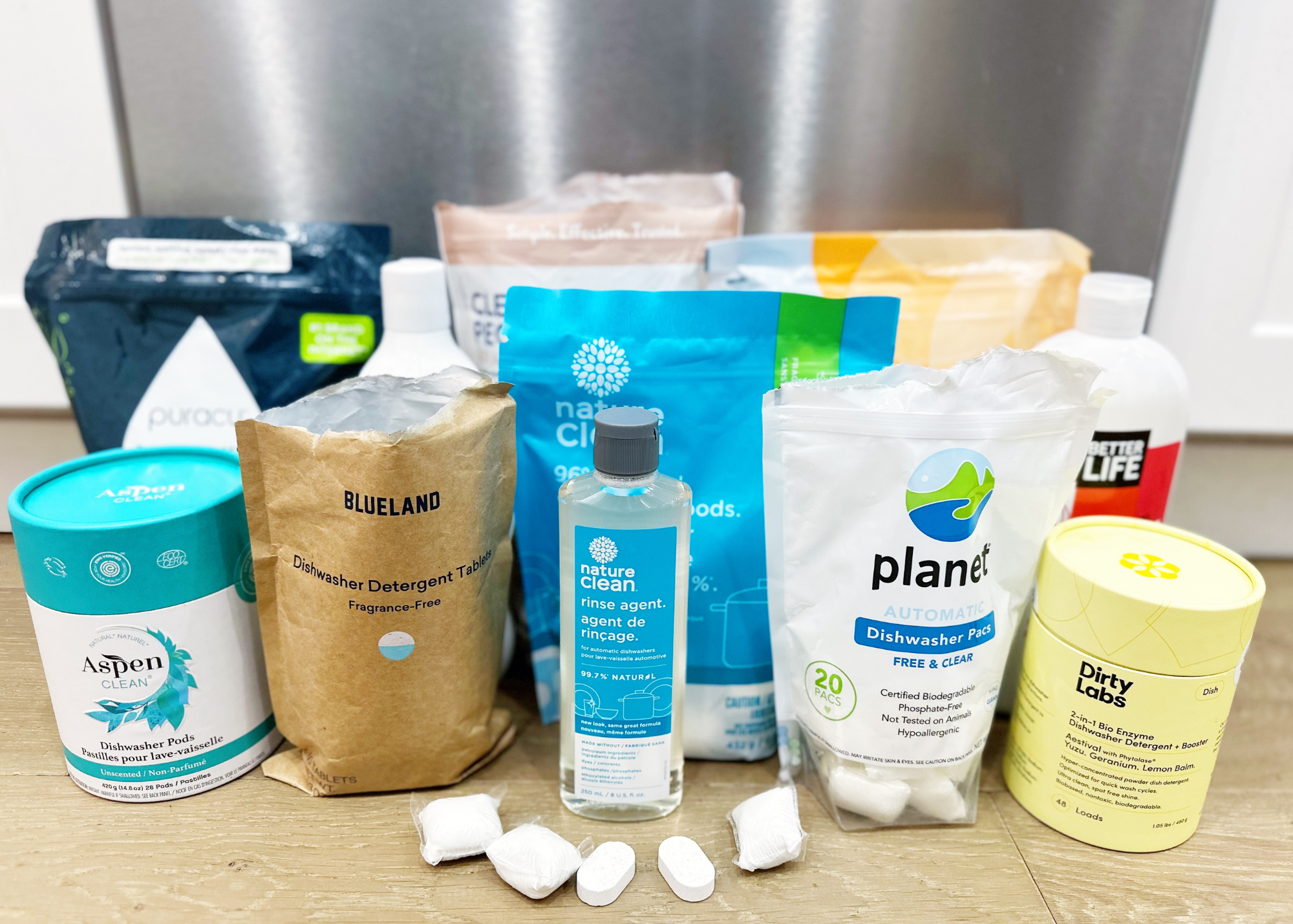

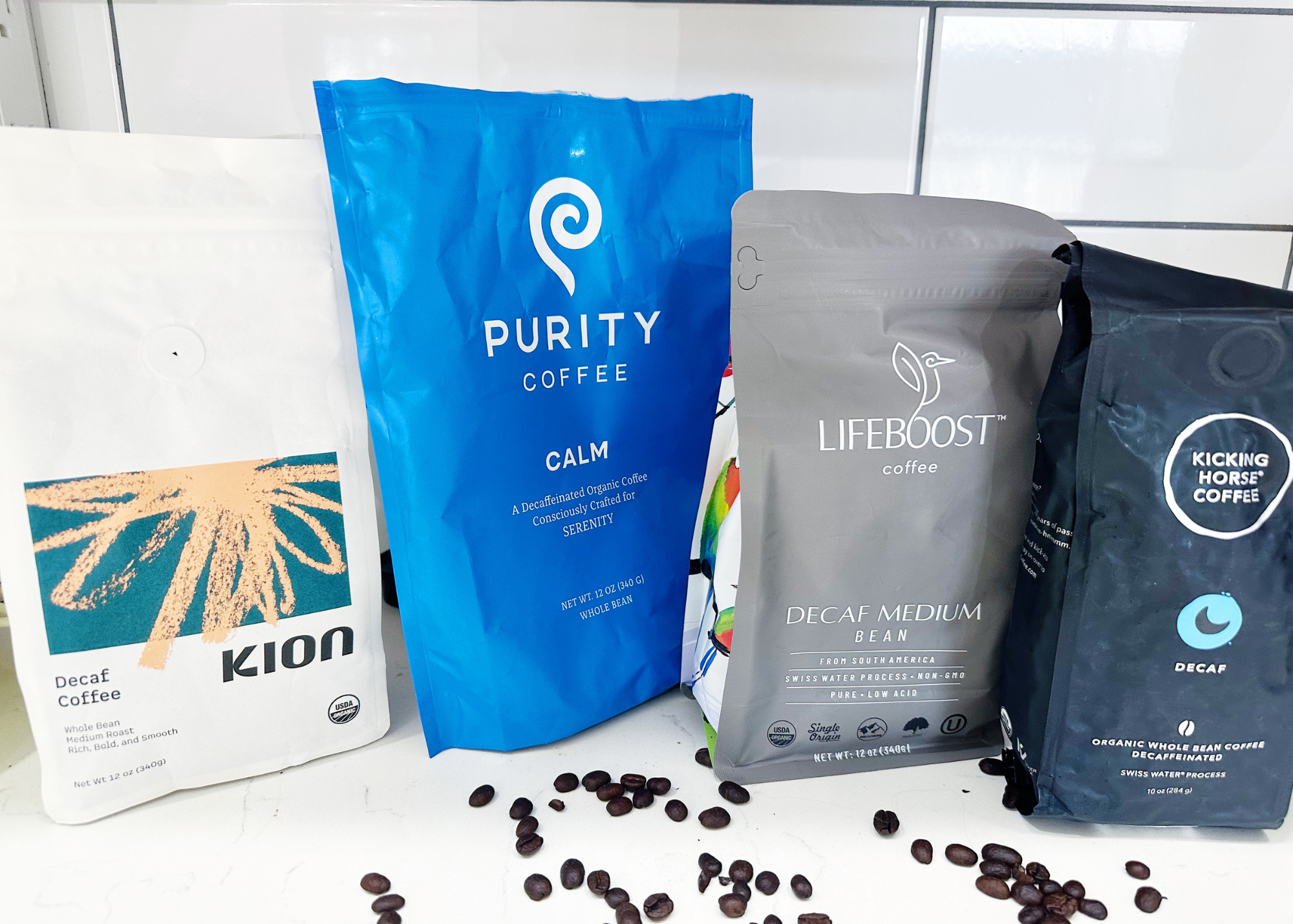
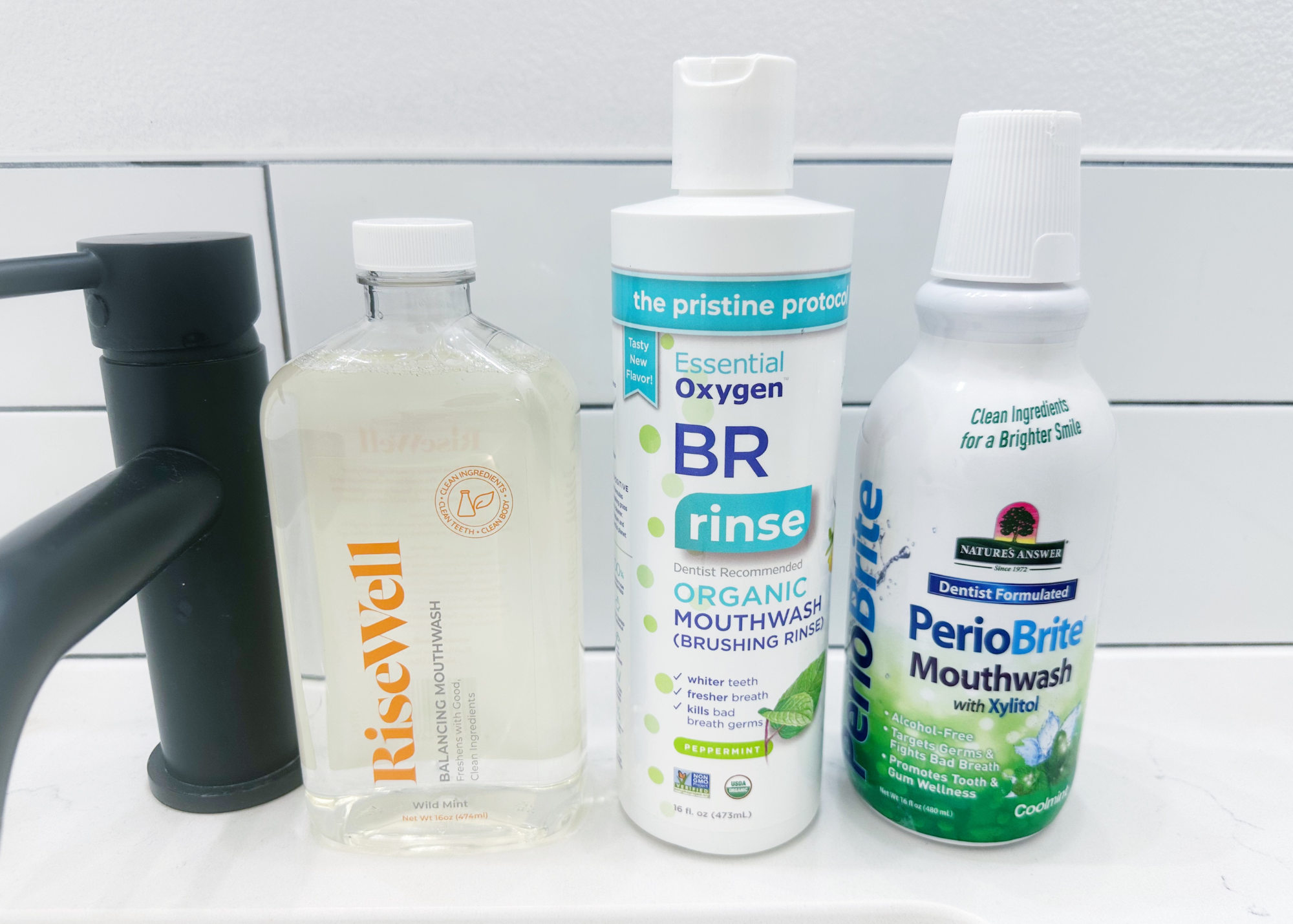
Thank you for the very helpful information.
I didn’t see you mention whether or not each brand gets rid of breastmilk residue.
Hi Ryan,
I’m not currently breastfeeding so wasn’t able to test to see if they were able to get rid of the breastmilk residue.